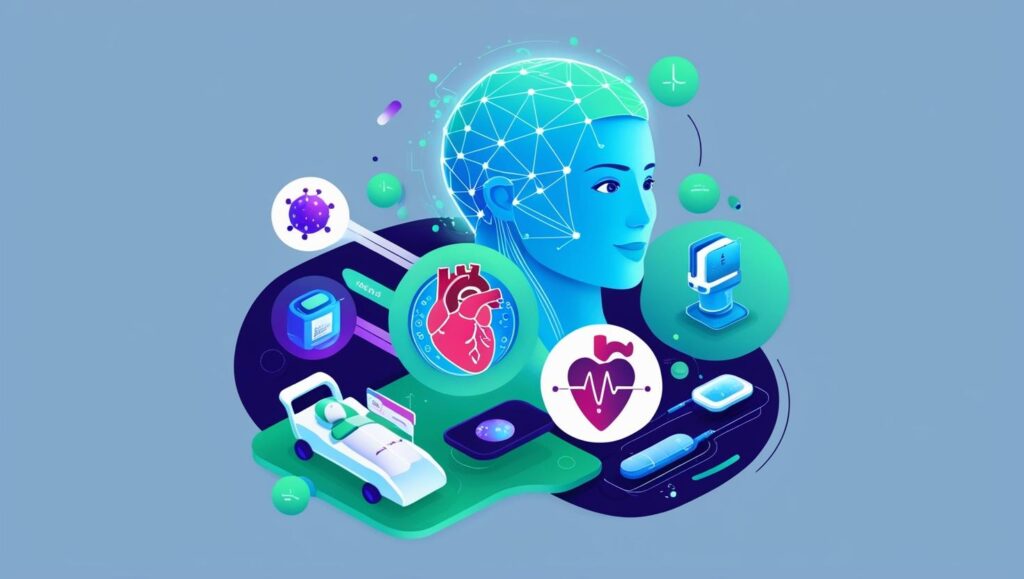
“AI in Healthcare: Bridging the Gap Between Data and Better Outcomes”
Artificial intelligence (AI) is rapidly transforming the healthcare industry, impacting everything from disease diagnosis and treatment to patient care and administrative efficiency[4][5]. AI’s ability to analyze vast datasets, identify patterns, and automate tasks is revolutionizing medical practices, leading to improved patient outcomes and streamlined healthcare operations[1].
Transforming Healthcare through AI
AI is being integrated into various aspects of healthcare, assisting medical professionals in making accurate diagnoses, creating personalized treatment plans, and improving overall health outcomes[1]. By swiftly analyzing large amounts of clinical data, AI can help identify disease markers and trends, offering clinicians data-driven insights that might be difficult to detect through traditional methods[3].
Key Applications of AI in Healthcare:
- Medical Diagnosis and Treatment: AI algorithms can analyze patient data to detect patterns and correlations that may be missed by human experts, enabling more accurate and timely diagnoses[1]. For example, IBM’s Watson for Oncology analyzes patient data to suggest personalized cancer treatments, improving clinical decision-making[1]. AI can also assess treatment effectiveness and suggest real-time adjustments, leading to better clinical outcomes and reduced healthcare costs[1].
- Medical Imaging Analysis: AI can analyze medical images, such as MRI and CT scans, to assist in disease diagnosis and treatment planning[1]. GE Healthcare’s AI-powered Edison platform automates the analysis of medical images, helping radiologists detect abnormalities more quickly[1]. AI algorithms can also identify brain tumors in MRI scans and detect early-stage diabetic retinopathy in retinal images[1].
- Electronic Health Records (EHRs): AI technology is becoming increasingly essential in EHR management, enabling the analysis of vast medical data to identify patterns that aid in disease prevention and treatment[1]. AI can scrutinize EHR data to identify high-risk patients and develop personalized prevention strategies, predict disease risks based on medical history and lifestyle, and flag medication patterns to prevent adverse drug reactions[1].
- Remote Patient Assistance: AI enables remote monitoring and patient assistance, emphasizing convenience, accessibility, and timely interventions, which enhances patient outcomes and reduces healthcare costs[1]. Philips’ HealthSuite Digital Platform, for instance, uses AI to remotely monitor patients’ vital signs, allowing for early intervention and reduced hospital readmissions[1].
- Virtual Assistants and Chatbots: AI-powered virtual assistants and chatbots are crucial in remote patient care, providing personalized health advice, pharmacy suggestions, and medication information[1]. These tools can also help patients schedule appointments and clarify upcoming visits, reducing the need to wait for professional guidance[1]. Buoy Health, for example, is an AI-based symptom checker that uses a chatbot to listen to a patient’s symptoms and guide them to the correct care[5].
- Drug Discovery and Vaccine Research: AI accelerates drug discovery and vaccine development by identifying potential drug candidates or vaccine targets more efficiently than traditional methods[1]. AI algorithms can predict the effectiveness and safety of compounds, leading to faster development and testing processes[1].
Benefits of AI in Healthcare
The integration of AI in healthcare offers numerous benefits, including:
- Improved Accuracy: AI models have demonstrated high diagnostic accuracy in various applications. For example, an AI model presented 93.8% diagnostic accuracy in identifying the BRAF V600E mutation in colorectal carcinomas[3].
- Increased Efficiency: AI can automate routine administrative tasks, freeing up time for medical professionals to focus on direct patient care[4]. AI systems can also identify uncommon sets of symptoms or bacterial strains much faster than a physician or laboratory[3].
- Personalized Care: AI and machine learning enable healthcare providers to deliver more personalized medical treatments and care[4]. AI allows for deeper analysis of patient data, uncovering associations that the human brain may not detect[4].
- Predictive Analytics: AI systems can analyze patterns in a patient’s medical history and current health data to predict potential health risks, enabling healthcare providers to offer proactive, preventative care[4].
Concerns and Future Directions
While AI offers significant potential benefits, it’s important to address potential concerns, such as data breaches, clinical implementation challenges, and ethical dilemmas[3]. As AI continues to evolve, its applications in healthcare will likely become more diverse and impactful[2]. The future of AI in healthcare includes connected and AI-augmented care, precision diagnostics, precision therapeutics, and precision medicine[2]. By leveraging AI, healthcare systems can optimize and expedite various processes, leading to improved patient outcomes and a more efficient healthcare system[5].
Citations:
[1] https://acropolium.com/blog/ai-in-healthcare-examples-use-cases-and-benefits/
[2] https://pmc.ncbi.nlm.nih.gov/articles/PMC8285156/
[3] https://en.wikipedia.org/wiki/Artificial_intelligence_in_healthcare
[4] https://www.foreseemed.com/artificial-intelligence-in-healthcare
[5] https://builtin.com/artificial-intelligence/artificial-intelligence-healthcare
[6] https://evidence.nihr.ac.uk/collection/artificial-intelligence-10-promising-interventions-for-healthcare/
[7] https://www.coursera.org/articles/ai-in-health-care
[8] https://www.delveinsight.com/blog/top-artificial-intelligence-based-healthcare-mobile-apps